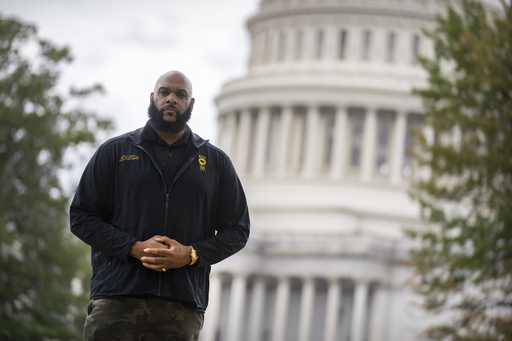WASHINGTON (AP) — John Hubert, an airport security officer in Fort Lauderdale, Florida, recalls helping fellow Transportation Security Administration workers get essentials from food banks when they worked without pay during the last government shutdown. By the end of the 35-day ordeal, he needed the same help himself.
Steve Reaves, a union leader for workers at the Federal Emergency Management Agency, went through three government shutdowns while working at FEMA, and remembers having to pull money out of his retirement early to make ends meet during that last one in 2018-19.
Jessica LaPointe, a Social Security Administration worker from Madison, Wisconsin, says she had to rely on financial help from friends and family during the 16-day October 2013 shutdown. In anticipation of the next one, she’s already postponing a planned family vacation to Disney World.
Across the country, federal workers still stung by the memories of past government shutdowns are grimacing and bracing for another potential extended closure. It’s a test not only of their ability to stay financially afloat, but also of their commitment to public service.
“We’re continuously put on the chopping block every year. It’s ridiculous,” said Hubert, 42, who has worked at TSA for 21 years. “We should not be put in this position every single year, then used as a bargaining chip to get legislation passed.”
With a Saturday deadline looming for lawmakers to approve more federal spending — a deal that is looking less and less likely — workers familiar with the exercise in Washington gridlock are increasingly worried.
Hubert, a leader in the TSA workers’ union within the American Federation of Government Employees, representing 1,400 members in his local, is preparing for what now feels like an inevitability — another extended period of work without pay.
“Just like other Americans, we’ve still got to pay our bills, regardless of what’s going on with Congress,” he said. “Officers with children, single parents are going to be dramatically affected if a shutdown continues over a long period of time.”
The White House and congressional Democrats, along with some Republicans, warn that a shutdown could be devastating for people who rely on the government for everyday services while putting a stop to paychecks for federal workers themselves and undermining America’s standing in the world.
“There are real consequences to real people in a real way when there is a shutdown,” Agriculture Secretary Tom Vilsack said at a White House press briefing on Monday. He estimated 50,000 workers just at USDA would be furloughed, affecting not only the workers but local economies where spending will be constrained.
Johnny J. Jones, secretary-treasurer of the TSA workers unit within the AFGE, said even a temporary loss in pay is a massive disruption for government workers who live paycheck to paycheck.
“People have to pay rent, they have child support payments,” he said. Landlords don’t care about a shutdown, he said, and bills will always be due.
“The number one question in our minds is how long is this going to last,” Jones said.
LaPointe, a mother of four who is also a union leader for 30,000 Social Security workers through AFGE, said a shutdown would be “a catastrophe” personally.
During the 2013 episode, “I definitely had to scramble to make sure there was enough money in my bank account,” she said. “That was a really stressful time.” She said she had to ask friends and family for help, with the assurance that she would be paid back by the government eventually.
On top of prepping for a shutdown, SSA agency leadership and her labor union are currently discussing the terms for potential longer-term furloughs, looking at 4,700 employees who could be let go throughout the year if there were an 8% cut in funding, based on Republicans’ current demands, she said.
“We already have 10,000 less workers since 2010 when baby boomers started to retire,” she said. A Partnership for Public Service survey ranks the Social Security Administration last among agencies in the “Best Places to Work” government-wide index.
“We don’t often feel like it’s worth it to be federal employees at the time of a shutdown,” LaPointe said.
Reaves, the FEMA union president, remembers pulling money out of his Thrift Savings Plan — a retirement and savings plan for federal employees — to stay afloat during the 2018 to 2019 shutdown, which resulted in additional taxes and fees.
“That affects our home finances for the next couple of years,” he said. “You pay extra to catch back up.”
He said that while FEMA workers love helping people and bringing comfort to those in disaster areas, the government gridlock makes their jobs harder. He suggests making pay for members of Congress also stop during shutdowns.
“If their checks were affected,” he said, “then it would be a different story. Then there wouldn’t be government shutdowns.”
Source: post





